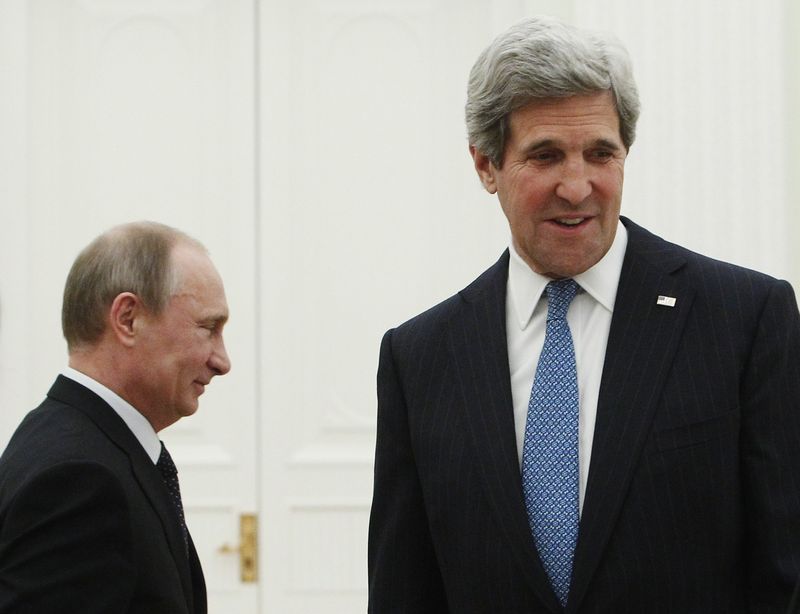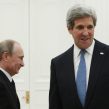
Kerry Succeeds in Faking Respect for Putin, but Fails in Building Trust with Russia
Publication: Eurasia Daily Monitor Volume: 10 Issue: 87
By:

The first days of May were a political lull in Russia as the lazy semi-official May 1 manifestations coincided closely with the celebration of Orthodox Easter. But the start of this week shattered the picture of harmony between the pious authorities and hard-working masses. Very different kinds of masses filled the now-famous Bolotnaya Square in Moscow last Monday (May 6). They gathered to express their outrage and disgust with the political repressions unleashed in carefully controlled but increasing doses after the clashes with police that occurred in that very place a year prior, on the eve of Vladimir Putin’s presidential inauguration (Kommersant, May 7). Putin tries to dismiss these protests as belonging to the political fringe and involving only the ever-grumbling intelligentsia, which is of no importance for the real work-in-progress in Russia. But the Kremlin’s lack of meaningful aims to improve the situation in the country amplifies disappointment in his leadership (Vedomosti, May 7). The “non-systemic” opposition is indeed bitterly divided between micro-factions and parochial interest groups; its street activity is less impressive than the virtual uprising in the fast-expanding social networks. Yet, it is this evolving protest movement that matters most for pulling Russia out of the quagmire of Putinism.
The trial of passionate blogger Aleksei Navalny has galvanized the disunited democracy adherents—whose momentum of protests from early 2012 had dissipated during this past, long winter. Navalny, who has emerged as one of the most recognizable leaders in the “white ribbons” camp, is being prosecuted on an implausible charge of embezzlement related to a timber business in the Kirovsk oblast. The nearly pre-determined “guilty-as-charged” verdict could have even greater significance than the imprisonment of Mikhail Khodorkovsky some 3,500 days ago (Vedomosti, April 24). Indeed, the aim of that previous “show trial” was to put fear into the arrogant “oligarchs” by proving that any of them could be investigated for past creative accounting. While now, the expanded aim is to scare the malcontents by establishing the fact that any of them can be thrown behind bars on a crudely fabricated charge (Novaya Gazeta, May 6). The sheer blatancy of this injustice is supposed to be the key to impress the “lily-livered” liberals and secure Putin’s victory over the opposition, which was announced by the former Kremlin insider Vladislav Surkov last week (Grani.ru, May 3).
It is in this charged and desperate atmosphere that the United States Secretary of State John Kerry arrived in Moscow on May 7. Kerry sought to make his long-planned first visit to Russia into a new start in a long relationship, which has slipped to a deep low just 13 months after the third START nuclear weapons reduction treaty was signed in Prague with great fanfare. Little opportunity exists to find common ground on Syria, where Moscow is eager to play on Washington’s reluctance to intervene, or to prepare a joint initiative on North Korea, where Moscow is set to follow Beijing’s lead (Rossiiskaya Gazeta, April 17). There may be, nevertheless, an opening for advancing the arms control agenda, particularly since President Barack Obama has shown attention to Russian concerns and effectively shelved the North Atlantic Treaty Organization’s (NATO) plans for deploying the fourth phase of the European missile defense system (Nezavisimoe Voennoe Obozrenie, April 26). Putin might be ready to scrap such exotic Russian designs as making strategic missiles mobile on railway cars, but he needs concessions from Obama on more than mere warheads or interceptors in order to start negotiations on tactical nuclear weapons (Ezhednevny Zhurnal, May 2). He wants to be shown due respect that would erase all reservations against the legitimacy of his leadership.
Kerry has come a long way in affirming this respect in the face-to-face meeting with Putin, but for this diplomatic act to be convincing he has to wash his hands of commenting on Russia’s domestic agenda—and he is probably not quite prepared to do this. He would not think of painting Putin as an “enemy of the free press,” as the media freedom organization Reporters Without Borders does. But he feels obliged to register Washington’s disappointment with the escalating repressions against human rights–defending non-governmental organizations (NGOs)—and every such motion, however circumspect, is interpreted by the Kremlin as proof positive of a hostile US intent to foster a “revolution” (Newsru.com, May 3). While seeking to dispel such suspicions, Kerry cannot ignore the pronounced disgust in many European capitals with doing business with Putin underpinned by the swing in public opinion against corrupt pseudo-democracy in Russia (Kommersant-Vlast, May 6). Putin’s promise to prepare a substantial answer to Obama’s arms control initiative before their planned meeting at the G8 summit in Northern Ireland or perhaps by Obama’s visit to Russia for the G20 summit in September is essentially aimed at maintaining suspense in the relationship without any serious intention to arrive at a culmination.
In fact, Putin’s need to fan and exploit anti-Americanism, which has traction among his core support base of the “patriotic masses,” is greater than the US administration’s need to confirm its commitment to support democratic reforms in Russia. Kerry’s main problem in Moscow, for that matter, is not the traffic—brought to a standstill by tanks training for the Victory Day parade in Red Square—but rather the growing mistrust in the opposition camp, which has reasons to see the US Secretary of State’s diplomatic maneuvering as a betrayal of their hard-fought cause. Bound by tradition, Kerry held a meeting with representatives of Russia’s civil society after his agenda with Putin and Russian Foreign Minister Sergei Lavrov. However, he can provide little reassurance to these “foreign agents”—as the Kremlin has come to refer to them—regarding Washington’s readiness to take their struggle seriously.
In dealing with degenerating authoritarian regimes, the best policy usually is to expand the range of connections with the squabbling elite groups around the aloof, “irreplaceable” boss and to build bridges to the rising forces that seek to expel the old elites; Putin, however, has effectively pre-empted such a policy. He controls all the connections with the US and makes it very hard for NGOs and opposition activists to maintain ties, which are taken for granted in open societies. It still takes two to tango, and the Obama team does not have to go along with such a pre-emption—but it does have to decide whether the fruits of exclusive engagement are rich enough to compensate for the bitterness of lost opportunities.




